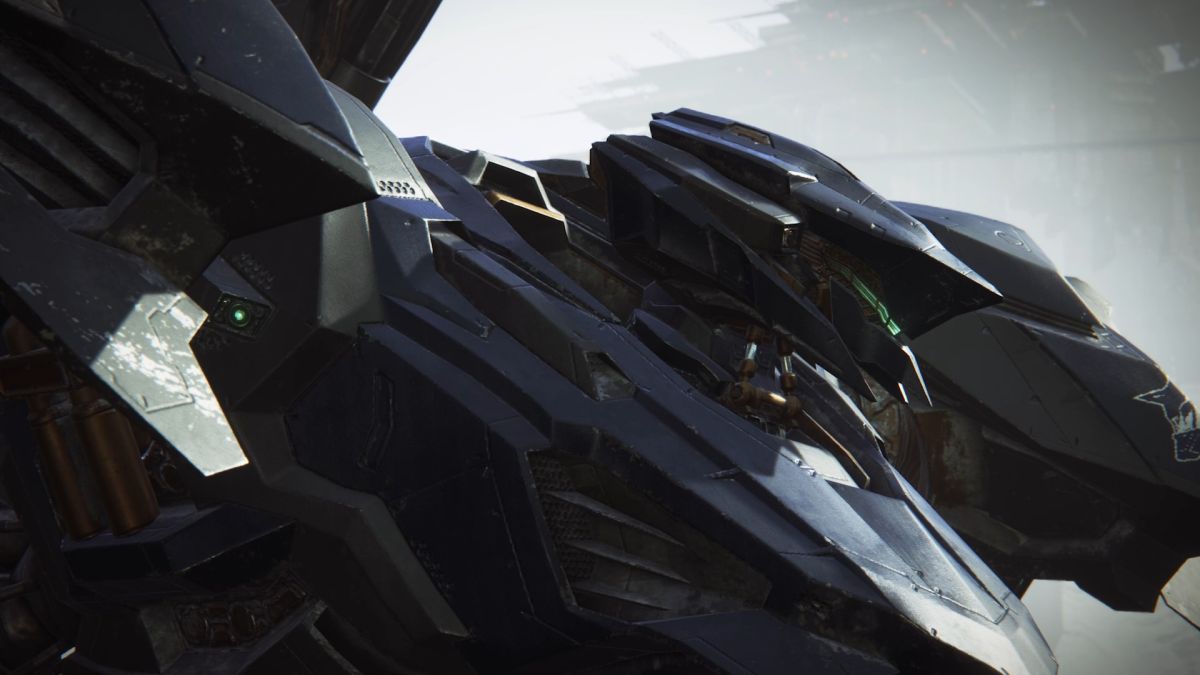There came a point, in playing Armored Core VI: Fires of Rubicon, that I determined I simply wasn’t going fast enough. By this point in my hands-on time, I had overcome plenty of enemy mechs, from simple cannon-fodder to named adversaries with callsigns. I was already a heavy-metal death machine. But I could be faster; not just in raw speed, but turning, target acquisition, and elimination. I could push this steel body faster than I currently was, faster than I probably should.
So I went into the garage and fine-tuned my machine. In battle, I practiced using my minimap and scan functions to see things my eyes, with one focal point, couldn’t. Heck, I cranked my camera sensitivity to the highest sensitivity it would go so I could pivot faster. If any of that sounds appealing to you, then Armored Core VI is right up your alley.
I got a chance to go hands-on with roughly the first chapter of Armored Core VI at a preview event, seeing the story unfold as the player character—a “dog” under the command of Handler Walter—gets embroiled in the conflict over the planet Rubicon 3.
Climbing the wall
It is what you’d expect story-wise from an Armored Core, in a good way. You pick up callsigns and handles, as you bounce between mercenary gigs for different factions in the ongoing battle for Rubicon. Some are fairly straightforward; go to a location, take out the target. They all, in some way, demand combat. And frequently, the odds are heavily stacked against you.
This is the first wall that I can see for some fans of developer FromSoftware’s more recent work. Though FromSoft has made a huge impact with its Souls series and spin-offs, the studio is unabashedly returning to the formula of an Armored Core game with its sixth numbered entry. Where other games might offer some alternative paths, Armored Core VI is a mission-based game. You can complete additional objectives and side content for more resources, but you have to proceed on the set path.
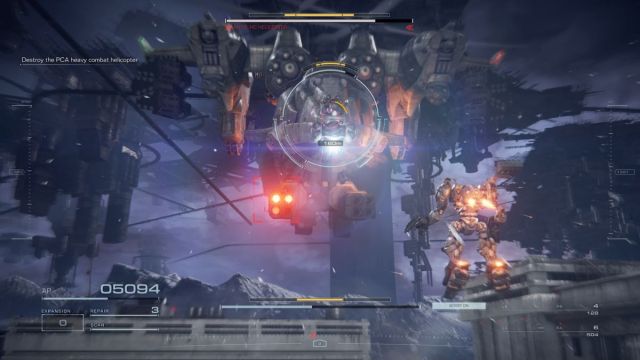
Personally, I dig this. A big part of the early first chapter is about getting the opportunity to “climb the wall.” What that means in-universe is just a looming mission objective. But for the gameplay demo, it was an obstacle I knew was coming. I would, eventually, have to scale a wall the developers had created. And it wasn’t going to be without obstacles.
Challenge is a well-known draw of FromSoftware’s games too, and Armored Core VI certainly has that. While smaller enemies can be easily dispensed with, a swarm of them may quickly become dangerous. Larger foes will bring more powerful weapons to bear, forcing you to adapt. Enemy mechs pose a massive risk once they start to have names and callsigns, posing an equal challenge to your own war machine. And bosses? Well, I think a lot of the footage and gameplay shown off speaks for how dangerous the bosses are.
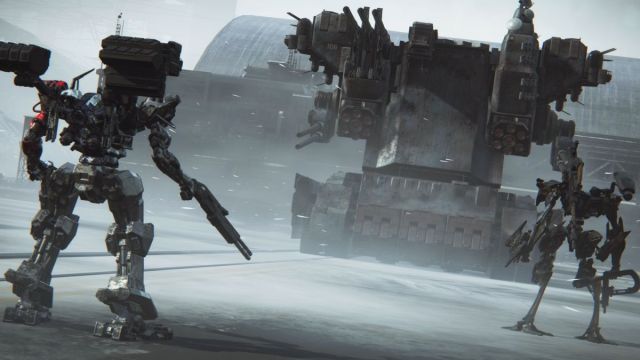
By comparison, you are one mech; sometimes you’ll be accompanied by some allies, but for the most part, assume you’re alone. You certainly have a solid machine, with plenty of weapons and tools at your disposal. But you can also push your machine to its limits to see how far you can take the weapons platform you’re piloting.
My personal preference was the sword and rifle, a very Gundam RX-78-2 loadout. Twin missile pods sat on my shoulders, and I was able to carefully dance around enemies, picking away at them with ballistics before finding my opening and swooping in for a devastating strike. The whole time, I was carefully managing my resources. Missiles and guns have ammo counts, and a sword dash could leave me vulnerable if I missed my swing.
Boosters engaged
The boost meter was a constant concern, and probably the most important mechanic for any pilot to master. FromSoftware has found a really good balance of speed and control in Armored Core VI; in an interview with the game’s leads, they said they set the speed back a notch from Armored Core: For Answer. But while you’re not topping out at the same speeds, there’s still certainly a sense of rapid movement.
A standard boost keeps you moving at a good pace, while an extra blast can add a quick burst of speed to dodge incoming attacks. Meanwhile, the Assault Boost feels like a way to immediately traverse great distance. Its massive spike of velocity can carry you far, but the start-up and slow-down could leave you vulnerable. Managing all of these options is crucial, alongside tracking your weapons, ammo, and terrain.
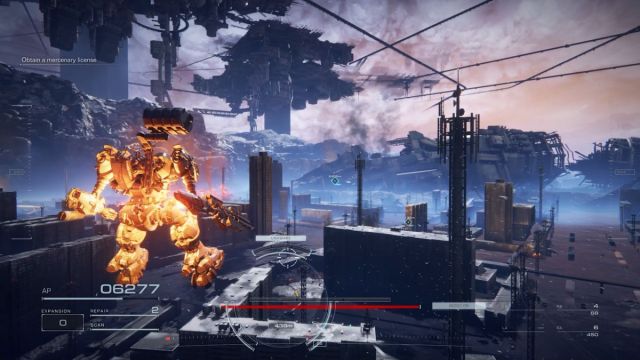
This can, at times, make Armored Core VI feel overwhelming. Early on, I felt myself hit a wall with a certain boss. It was heavily armored in the front, meaning I had to focus on striking its back. And while the fight started off easy enough, I was soon left to fend for myself against an enraged behemoth, launching tons of firepower at me and littering the arena with explosives.
Hitting that wall, though, pushed me even further. I carefully watched the boss’ motions. Over time, I gauged the ranges he preferred to use certain attacks from, and when. I’d find ways to position myself perfectly, so that when I leapt over and stabbed him in the back, I could safely escape before he did a damaging spin-out.
Going back to the garage and retooling my mech helped a ton with this, and to FromSoftware’s credit, this is where some leniency comes in. The checkpoint system feels generous, and lets players hit the garage mid-stage or after a wipeout to retool and re-enter. Customization is a big factor in Armored Core VI, where bringing certain weapons or tools can give you the exact edge you need in a given situation. Some missions were well-suited to my “Heavyarms” loadout, dual-wielding automatic guns. Others, like the boss above, were much easier with a sword and rifle.
Still, I was left with one big question, after playing hours of Armored Core VI. This is a game that is, unabashedly, a new Armored Core. I don’t personally feel like it’s trying to make a bid for newcomers’ hearts through any concessions; rather, FromSoft is trying to create a modern Armored Core, potentially bringing in new players while retaining the pieces that made this series what it was. I wondered if that would land with anyone who never tried Armored Core, or bounced off of it years ago.
Armored Core VI is a game that appeals to me, personally. I like mechs. I dig customization. Constant improvement and challenge have steadily become a go-to beat for me. There really wasn’t a question of whether I would be into this game. But for less mech-inclined, challenge-seeking players, I wondered what they would think of Armored Core VI.
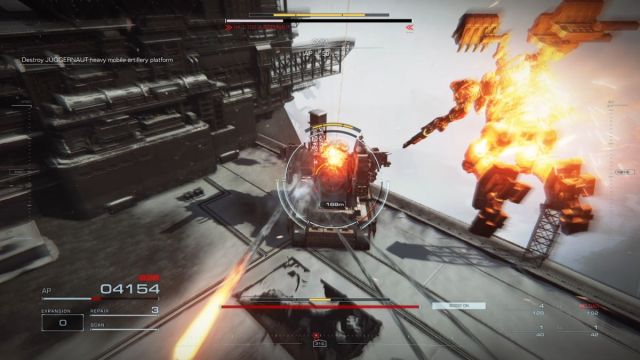
Within mission parameters
If anything makes a bid for those players’ hearts in Armored Core VI, it’s the missions themselves. Rather than exploring some steadily expanding world with hubs and spokes of exploration to uncover, you’re sent on specific sorties. But those confines let individual missions sing. They can narrowly focus on a specific, interesting objective, like taking out certain targets or hunting down a unique mech. Even through narrative, they can resonate. One mission pit me against a clear novice in a prototype, and his frightened radio chatter as he found himself in a duel with an ace pilot left a haunting note on all the action.
These missions can also expand into massive, exciting battles, like one against a giant walker with a devastating laser turret. I had to fly through the desert, taking cover in sandstorms and behind dunes as a terrifying laser tried to swat me like a fly. Then, I had to take down a leg and climb the walker, taking out defense subsystems on the way, and eventually knock out its main cannon. The whole experience feels thrilling, and it’s easily replayable thanks to the mission structure. No need to rekindle a flame or anything; just head to the missions tab and re-run it.
Those incredible moments, alongside the customization that I suspect is a bit more interesting for FromSoft players than they’ll expect, seem like enough to draw newcomers in. I do hope they give this game a genuine try, too, and discover what I enjoyed about it.
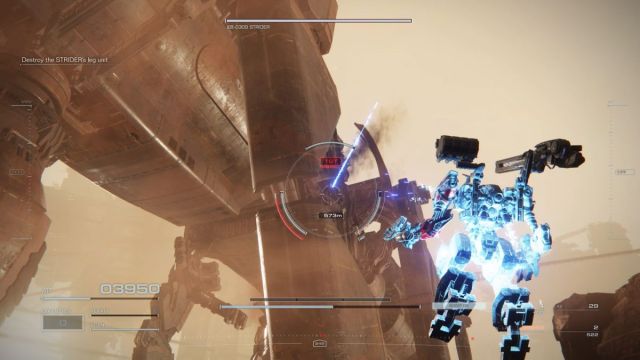
As much as I dug the garage, and the giant fights, and all the morally gray ethics of my mercenary work on Rubicon on the battlefields of corporations and resistances, it was the speed that stuck with me. Handling a mech in Armored Core VI just feels good. It’s almost violently fast at times. There’s a sense of friction, as you try to manage four different weapon slots and a boost meter, while eyeing the terrain, dodging incoming attacks, and plan your next strike.
It felt, early on, like potentially too much data for the brain to manage. But that overwhelming feeling gives way to a flow state. As I internalized it more and more, shoved more pieces of Armored Core VI into parallel processing, where ammo management felt like checking my side mirrors on the highway, I could feel how I could push further. And the arena matches, which are essentially Gran Turismo license test-style duels against opponents in their own mechs, saw me tackling increasingly intimidating opponents, pushing even further, until I emerged victorious.
So if all of that sounds good, then Armored Core VI is really something you should be watching for. There are many ways to make a mech game, but few in recent memory have had me teetering on that edge, of either glory or ruin, quite like the fast and furious mechs of Armored Core have.
Travel for this media preview was provided by the publisher.
